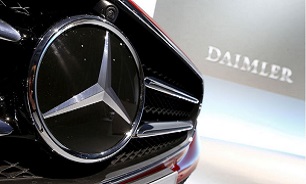Iran sanctions affect Daimler investments
U.S. President Donald Trump’s desire to isolate the Iranian economy seems to be working.

Khdorocar - Within hours of Washington unveiling its first round of sanctions, German carmaker Daimler AG froze a plan to make Mercedes Benz trucks in Iran. That’s even after the European Union tried to salvage the Iran nuclear deal by pledging to protect firms from Trump’s assault.
"I wouldn’t be surprised if more companies were to follow Daimler out of Iran,” said Frank Biller, an automobile analyst based in Stuttgart, Germany, for Landesbank Baden-Wuerttemberg. "With the political situation right now, I’m sure a lot of companies are at least thinking about suspending their activities.”
Companies across Europe — from French energy giant Total SA and German carmaker Volkswagen AG — had initially announced plans to reestablish ties with Tehran following the 2015 deal that provided Iran with relief from economic sanctions in exchange for curbs on its nuclear program. Trade between the Islamic republic and Europe surged to more than $10 billion.Yet while Trump’s European allies condemned his move because they regard the nuclear deal as crucial for international security, the challenge for businesses is that they now have to weigh the potential loss of American clients against economic ties with Tehran that are minuscule by comparison. Even in May, when Trump was just threatening to reinstate sanctions, Total said it couldn’t risk investing in Iran following the return of U.S. sanctions because of its large U.S. operations. A host of other companies, including French carmakers Renault SA and PSA Group, have also said they’d backtrack on Iran plans.
"Anyone doing business with Iran will NOT be doing business with the United States. I am asking for WORLD PEACE, nothing less!” Trump said in a Twitter post on Tuesday.
Following an executive order signed by Trump, the United States imposed new restrictions intended to stop the purchase of dollar banknotes by Iran, prevent the government from trading gold and other precious metals and block the nation from selling or acquiring various industrial metals. The measures, which took effect at midnight in Washington, also targeted the auto industry and banned imports of Persian carpets and pistachios to the United States.
The European Union condemned the move and announced it was rolling out an updated version of its so-called Blocking Statute, which bans any EU company from complying with U.S. sanctions and does not recognize any court rulings that enforce American penalties.
For European companies, Iran became an investment hot spot following the 2015 accord because it is home to 82 million consumers who were starved of most Western products for years under international sanctions. Before dropping business in Iran for a first time in 2010 under those penalties, for instance, Daimler had sold as many as 10,000 vehicles there annually. The company had not yet resumed sale or production of cars or trucks before the pullout announced Tuesday.
"I wouldn’t be surprised if more companies were to follow Daimler out of Iran,” said Frank Biller, an automobile analyst based in Stuttgart, Germany, for Landesbank Baden-Wuerttemberg. "With the political situation right now, I’m sure a lot of companies are at least thinking about suspending their activities.”
Companies across Europe — from French energy giant Total SA and German carmaker Volkswagen AG — had initially announced plans to reestablish ties with Tehran following the 2015 deal that provided Iran with relief from economic sanctions in exchange for curbs on its nuclear program. Trade between the Islamic republic and Europe surged to more than $10 billion.Yet while Trump’s European allies condemned his move because they regard the nuclear deal as crucial for international security, the challenge for businesses is that they now have to weigh the potential loss of American clients against economic ties with Tehran that are minuscule by comparison. Even in May, when Trump was just threatening to reinstate sanctions, Total said it couldn’t risk investing in Iran following the return of U.S. sanctions because of its large U.S. operations. A host of other companies, including French carmakers Renault SA and PSA Group, have also said they’d backtrack on Iran plans.
"Anyone doing business with Iran will NOT be doing business with the United States. I am asking for WORLD PEACE, nothing less!” Trump said in a Twitter post on Tuesday.
Following an executive order signed by Trump, the United States imposed new restrictions intended to stop the purchase of dollar banknotes by Iran, prevent the government from trading gold and other precious metals and block the nation from selling or acquiring various industrial metals. The measures, which took effect at midnight in Washington, also targeted the auto industry and banned imports of Persian carpets and pistachios to the United States.
The European Union condemned the move and announced it was rolling out an updated version of its so-called Blocking Statute, which bans any EU company from complying with U.S. sanctions and does not recognize any court rulings that enforce American penalties.
For European companies, Iran became an investment hot spot following the 2015 accord because it is home to 82 million consumers who were starved of most Western products for years under international sanctions. Before dropping business in Iran for a first time in 2010 under those penalties, for instance, Daimler had sold as many as 10,000 vehicles there annually. The company had not yet resumed sale or production of cars or trucks before the pullout announced Tuesday.
Latest News


